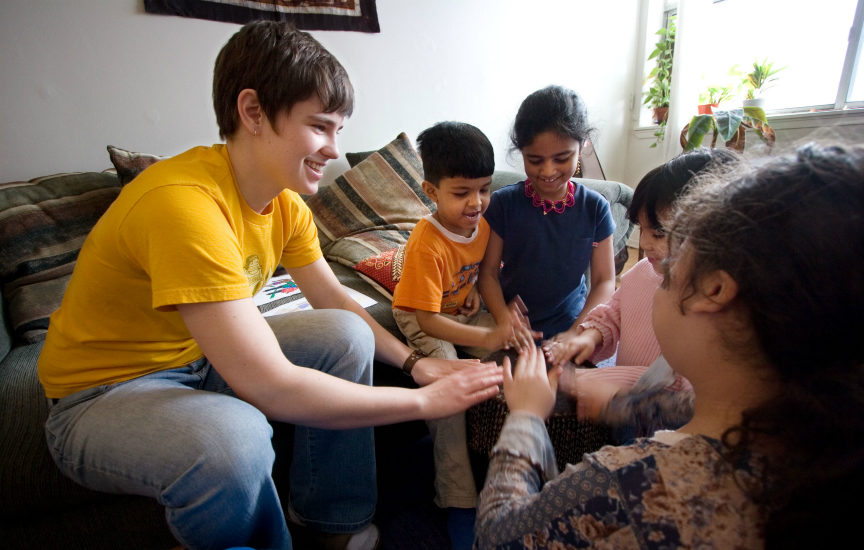Highlighting Australia
- As a proudly Australian initiative, we’re excited to showcase a collection of Australian stories, music, tributes and more.

Join activities, celebrations, study groups, spiritual empowerment and education programs for young people, and more.
Baha’i beliefs address essential spiritual themes for humanity’s collective and individual advancement. Learn more about these and more.


Shed the light of a boundless love on every human being whom you meet, whether of your country, your race, your political party, or of any other nation, color or shade of political opinion.
– Abdu’l-Baha1
The security of people of Middle Eastern and South Asian descent living in the United States seems to be on thin ice: bearing brown skin and a “foreign” name are dangerous liabilities. Evidence comes in recent hate crimes like February’s Kansas killing. Engineers Srinivas Kuchibhotla and Alok Madasani were attacked by a man who told them to “get out of my country.” Kuchibhotla died. The attacker later disclosed that he thought his victims, who were natives of India, were Iranian. In March, Hasel Afshar returned to his Oregon town from vacation to discover his home ransacked and hateful messages coating the walls of his house. The messages indicated that the attackers believed Afshar to be Muslim. He is actually a Baha’i refugee from Iran. Persecuted for his faith in his homeland—attacked for his foreignness in his refuge.
As someone who lives in the United States, I don’t fear becoming the victim of a hate crime because of the pale skin I’ve inherited from European ancestors, despite my own Iranian heritage and “foreign”-sounding name. Yet I know how arbitrary my safety is. My mom—daughter of an immigrant, a little darker than me, maiden name a little more foreign—faced harassment as a teen in Wisconsin during the Iranian Revolution. Some schoolmates occasionally called at her in the high school’s halls, “Watch out, she’s a terrorist!” or “Hostage taker!”
The pain inflicted by racism and xenophobia is always fresh and new, even though these social ills stretch back centuries. Countless humans over long years have had their lives deformed by prejudice.
The cynic will observe this shameful history and observe, hatred of difference is obviously part of human nature. But religion teaches otherwise.
One of the key Baha’i tenets is that every human is inherently noble. We are all, in our inmost reality, spirits, and we all have the capacity to develop godly attributes during our time on Earth. Though the spirit can affect the body’s health, the body’s qualities (color, gender, ability, etc.) do not touch the spirit.
The only real difference between people is their degree of spiritual development. Every other distinction—the attribution of moral traits to physical qualities like color and birthplace—is artificial, the invention of humans, with no spiritual meaning.2 Baha’u’llah exhorts us to “forgive the sinful, and never despise his low estate, for none knoweth what his own end shall be.”3 We don’t even know where we stand in the eyes of the Omniscient—how can we judge others’ spiritual status?
Indeed, humans can never know each other’s degree of spiritual attainment—that knowledge is the preserve of the Divine. Baha’u’llah exhorts us to work on our own faults and forget the shortcomings of our fellows: “How couldst thou forget thine own faults and busy thyself with the faults of others? Whoso doest this is accursed of Me.”4 Even if we think we can perceive that someone else is struggling spiritually, that’s no cause for separating from them—we need to treat them even better. Abdu’l-Baha admonishes us to “show the utmost love and patience” to people “whose thoughts are material and retrograde.”5
All prejudice, then, is baseless. Witnessing the divisions in Western society during His 1911–13 journey, Abdu’l-Baha urged the Baha’is to work toward the elimination of prejudice: to bring together natives and foreigners; White and Black people; Christians and Muslims—to help humankind realize the falsity of material distinctions.
This is not to say that material distinctions lack a purpose. Differences obviously exist, but this diversity is a boon, as Abdu’l-Baha explained through the metaphor of a garden. Who would want a garden with one kind of flower only? The effect would be monotonous. Human diversity should be enjoyed like a garden featuring an array of flora in gorgeous rainbow hues.6
To me, the Baha’i perspective on human difference provides a straightforward method for confronting the prejudices I’ve inevitably imbibed. For any negative reaction I have to someone, I should ask myself, “Is my response based on their skin color? Their gender? Their accent? Their birthplace? Their poverty? Their wealth? Their apparent spiritual inferiority?” If yes to any of the above, then my response is based in falsehood.
Again, the only real distinction between humans is in the degree of spiritual advancement, which we as humans can never measure. The closest I can come to that knowledge is in examining the purity of my own soul—an activity that should give me little time to evaluate others.
***
Sunayana Dumala, widow of Kuchibhotla, grieves the premature passing of her husband’s “very lovable soul.” She hopes our leaders will provide greater protection against hate crimes.7
Afshar expressed his fear at the attack, but he also has a message of reconciliation for his attacker: “If they ever catch who broke into my house, I won’t press charges. I will give him a hug, tell him I love him, and explain that Muslims aren’t bad people. I would tell him that Muslims are just as honest and hardworking as anyone else. I will tell him that if I, a Baha’i who has been oppressed by Muslims, can find love in my heart, then he should be able to as well. And I’d want to sit down with him and help him get there.”8
My mom finally confronted her harassers, telling them that her fellow Baha’is in Iran were targeted by Khomeini’s regime, imprisoned and killed unjustly. The boys awkwardly apologized.
If the victims of prejudice have hope for purging society of this ill, we all can. Hating difference is not human nature. Remember who you are: a spirit—temporarily connected to a body—with great capacity for love, kindness, and justice. Multiply your capacity by 7.5 billion, and we’re looking at a lot of potential for spiritual progress in our world.
"*" indicates required fields

We recognise their continuing connection to land, waters and community. We pay our respects to Aboriginal and Torres Strait Islander people and their cultures; and to elders both past and present.
The views expressed in our content reflect individual perspectives and do not represent authoritative views of the Baha’i Faith.

Visit the site of the
Australian Baha’i Community
and the Baha’i Faith Worldwide
Notifications
Great article!!! the answer to my prayers! thank you so much!!!
Elizabeth Pakravan (May 5, 2017 at 7:26 PM)
Thank you for your kind comment, Elizabeth!
Layli Miron (May 5, 2017 at 1:39 AM)
Inspiring. Thank you so much.
Patricia Wilcox (May 5, 2017 at 11:48 PM)
And thank you for reading, Patricia!
Layli Miron (May 5, 2017 at 1:38 AM)
Overcome hate with love.
Criselda R. Figuerres (May 5, 2017 at 6:32 AM)
Indeed! Thank you for reading, Criselda.
Layli Miron (May 5, 2017 at 1:37 AM)
Excellent article. Much needed!
Have found recalling Hidden Words (Arabic) 12 also helpful when thinking of others.
Andrew Mancey (May 5, 2017 at 6:58 PM)
Andrew, thank you for sharing this reference. It is indeed so important to remember that each human being contains “the essence of [God’s] light”!
Thank you for reading the article!
Layli Miron (May 5, 2017 at 2:06 PM)